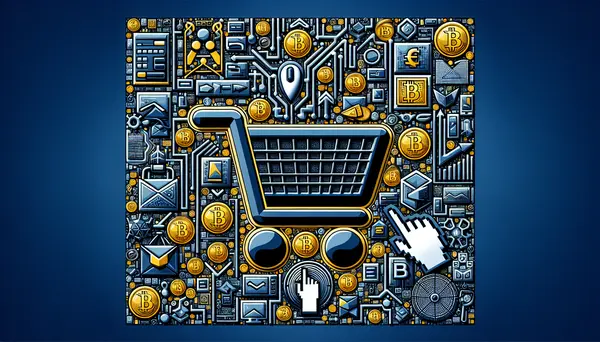Table of Contents:
Introduction to Bitcoin's Role in Online Marketplaces
When Satoshi Nakamoto introduced Bitcoin in 2009 as a decentralized digital currency, he possibly didn't know the profound impact it would have on online marketplaces today. Bitcoin, with its secure, transparent and peer-to-peer transaction capabilities, has found favor with many online businesses globally. Bitcoin has thus disrupted the traditional monetary systems and become a preferred mode of transaction for many people. This article explores the potential advantages and challenges of Bitcoin's integration into online marketplaces. Are we looking at a complete overhaul of online transactions or just another temporary shift in the dynamic world of the internet? Let's delve in.
Understanding Bitcoin
Before diving into the intricacies of Bitcoin's integration in online marketplaces, a brief overview of what Bitcoin truly is was needed. Bitcoin is a digital currency established on a technology called blockchain. This technology assures the security, transparency, and decentralization of Bitcoin transactions. Unlike traditional currencies governed by central banks, Bitcoin operates independently, free from central control, making it a truly global currency.
The Best Mining Providers at a Glance
» Infinity HashFrom our perspective, currently the best mining provider on the market. With the community concept, you participate in a mining pool completely managed by professionals. A portion of the earnings are used for expansion and maintenance. We've never seen this solved as cleanly anywhere else.
» Hashing24A well-known and established cloud hosting company. With a good entry point and in a good market phase, a good ROI can also be generated with some patience. Unfortunately, we see the durations as a major drawback.
Bitcoin's Role in Online Marketplaces: Insights into Benefits and Challenges
| Pros | Cons |
|---|---|
| Eliminates Banking Fees | Volatility of Bitcoin Value |
| User Anonymity | Uncertain Regulatory Status |
| Peer-to-Peer Focus | Bitcoin Transactions are not Reversible |
| Easier International Trade | Limited Acceptance and Use |
| Access to Historically Inaccessible Markets | Popularity in Illicit Activity |
The Advantages of Bitcoin Integration in Online Marketplaces

The use of Bitcoin as a means of transaction brings along several advantages contributing to its growing popularity among online marketplaces. One of the key pros includes transaction speed. Paid for that cute bag in a jiffy irrespective of official holidays or bank working hours! Bitcoin transactions occur instantaneously, making it an ideal mode of payment for online consumers.
Another notable advantage is reduced transaction costs. Payments made through traditional banking systems involve numerous intermediaries, leading to exorbitant transaction costs. Bitcoin, being a peer-to-peer transaction system, eliminates such middlemen, making transactions cheaper.
Finally, Bitcoin transactions are highly secure. Thanks to the underlying blockchain technology, all transactions are transparent and cannot be manipulated, offering enhanced security to both buyers and sellers in online marketplaces.
The Disadvantages of Bitcoin Integration in Online Marketplaces
While Bitcoin brings a myriad of benefits, its integration into online marketplaces is not without its fair share of hurdles. One significant drawback corresponds to the volatile nature of Bitcoin prices. A high swing in the prices of Bitcoins affects the resultant sales or purchase expenses in online businesses, making it somewhat unreliable.
Further, Bitcoins lack of regulatory oversight has often led to concerns of its misuse for illegal activities. While the anonymity that Bitcoin offers can be a strength, it also poses a challenge. The inability to trace payments can be potentially harmful to businesses should disputes arise over transactions.
Lastly, the complexity of the technology involved and a steep learning curve inhibit many from adopting Bitcoin, making the possibility of universal acceptance a Herculean feat. Its use still remains confined largely to tech-savvy users, and the idea of using digital wallets and secure keys can be daunting to a majority of the populace.
Notwithstanding the few challenges, it’s worth noting that newer systems are being instituted daily to make Bitcoin usage more comfortable, secure, and advantageous.
The Impact of Bitcoin on Financial Education

As transactions become more digital and Bitcoin continues to break new ground, the need for financial education grows. Bitcoin's impact pushes us to reassess the traditional pillars of finance such as banks and cash, while creating a compelling argument for the digital revolution of money. In the educational sphere, this has resulted in increased importance given to financial literacy in technology, blockchain, and digital transactions.
On a broader scale, Bitcoin has hastened the spread of awareness about alternative forms of currencies, interconnected markets and the power of decentralization. This has not only affected individual knowledge and understanding but also initiated changes at institutional levels. Schools, colleges and professional institutes are now introducing dedicated programs and modules to educate individuals about the functioning, use, and reliability of cryptocurrencies, Bitcoin being the forerunner.
These strides in financial education will in turn bolster the efficiency, security, and transparency of online marketplaces, leading to better informed decision-making by both businesses and consumers. This reflects how Bitcoin's role extends beyond just transactions, permeating into the realm of financial literacy and education.
The Future of Bitcoin in Online Marketplaces
The advent of Bitcoin in online marketplaces is no longer a thing of the future, it's happening right now. Despite the challenges, Bitcoin's user base continues to grow, indicating its increasing acceptance in the business world. Not only from a transactional perspective, but Bitcoin is also influencing how businesses strategize and consumers spend, spurring a fresh wave of innovation in commerce.
Marketplaces are currently developing systems and platforms that allow the seamless integration of Bitcoin into their operations. For instance, payment gateways supporting Bitcoin and refund mechanisms designed for the digital currency are rapidly evolving. It's not just startups or internet giants, but traditional firms are also exploring potential synergies with Bitcoin, reflecting the currency's potential to fundamentally alter the business landscape.
Bitcoin's future also lies in its potential to help underbanked populations engage with the digital economy. Due to its decentralized nature and wide-ranging accessibility, Bitcoin has the potential to democratize online marketplaces and create a more inclusive digital economy.
In conclusion, despite its volatility and the steep learning curve associated with its use, Bitcoin's strengths outweigh its limitations. The transparency, security, reduced cost, and faster transactions that it offers make it a force to reckon with in the future of online marketplaces. As businesses and individuals alike get more accustomed to this digital wave, Bitcoin could become the norm for online transactions.
Conclusion: The Pros and Cons of Bitcoin's Integration in Online Marketplaces

To sum up, the integration of Bitcoin in online marketplaces is truly a mixed bag. It has ushered in a host of opportunities to enhance transaction speed, reduce costs and elevate security levels. The widespread acceptance of Bitcoin can revolutionize the way online businesses operate and open up new growth avenues both domestically and internationally.
On the flip side, the major pitfalls of Bitcoin such as its price volatility, regulatory concerns, and the requirement of a better understanding of its underlying technology cannot be overlooked. They present significant barriers to universal acceptance and pose a deterrent to its full-scale adoption.
Moving forward, continuous advancements in technology, effective regulatory framework and a more informed populace will play crucial roles in determining whether Bitcoins pros outweigh its cons. As of now, Bitcoin sits at the crossroads of unprecedented potential and lingering challenges.
On the bright side, Bitcoins rise in online marketplaces has triggered a significant shift in financial education, promoting a deeper understanding of digital currencies, blockchain technology and financial literacy on a global scale. This is a positive development, promising a future where educated choices can mitigate risks and maximize the benefits of integrating Bitcoin and other cryptocurrencies into online marketplaces.
Impact of Bitcoin's Integration on Online Marketplaces
What are the advantages of integrating Bitcoin into online marketplaces?
There are several advantages, including lower transaction fees compared to traditional payment methods, availability around the globe, potential to attract more customers, and elevated level of privacy and security.
What are the disadvantages of integrating Bitcoin into online marketplaces?
Some of the problems include volatility of cryptocurrency prices, the risk of digital theft, non-reversibility of transactions, and regulatory ambiguity.
Is Bitcoin integration easy to implement on online marketplaces?
Bitcoin integration can mandate considerable technical expertise and understanding of cryptocurrencies. Various third-party services can help in easing this process.
Do customers prefer using Bitcoin on online marketplaces?
The preference is split. Some users appreciate the perks of Bitcoin like privacy and low fees, while others stay with traditional payment methods due to Bitcoin's price volatility and complexity.
Is Bitcoin legally accepted on online marketplaces?
Legal recognition of Bitcoin varies from country to country. Some have embraced it, while others have imposed restrictions or bans. Always check local regulations before integrating Bitcoin into an online marketplace.










